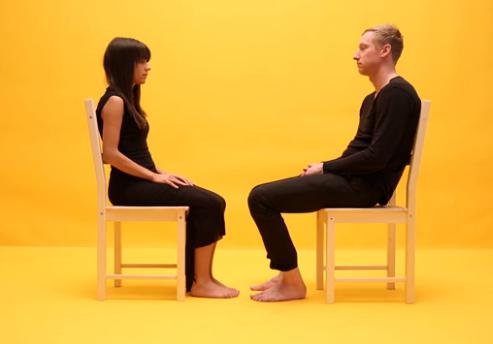Any addicts of the 40 Days of Dating project know that the big reveal happens this week: Are Jessica and Timothy still together? On their Disney trip did they grow fat and happy like your average American couple? Or did the pressure finally get to them?
Earlier this year two New York graphic designers, Jessica Walsh and Timothy Goodman, launched a charming and excruciating experiment. They were good friends who used to talk about their adventures on the New York dating scene. Walsh is a “hopeless romantic who jumps into relationships very quickly.” Goodman is “afraid of commitment and tends to date many girls at the same time.” For 40 days they decided they would date, meaning go out once a day, not go out with anyone else, and blog about it. This is not a rom-com. It actually happened. They blogged the first 36 days in the spring and saved the final four for this week. The results are pretty revealing.
Is the theater of falling in love the same as falling in love? Apparently yes. Can men and women truly be friends? Apparently no. The drama, the couples’ therapist, the daily contact—eventually it all got to them. By day 12 Jessica’s “crazy” was turning Tim on, and by day 18 they were making out in a cab. Then Tim, true to type, began to back off, but thanks to the therapist he didn’t have to hide his feelings, from Jessica or the universe:
Tim seemed overwhelmed by the pressure, and he began to pick me apart again. He said some of the most hurtful things anyone has ever said to me. I have not done anything to deserve this, and have no reason to put up with it. The therapy session ended with me in tears trying to walk away from this experiment once again.
Back and forth they went, like a reality show, only in print. Readers from as far away as Japan and Bulgaria rooted for them. By the last entry, Tim was sounding soft, committed, the antidote to the Matt Weiner dictum that at the end of the day, your basic problem is that “you are still you.”
For the first time, I could really sense that she likes me. I hadn’t felt that energy from her the way I did this morning. These little smiles and gestures and courtesies. I felt like we were “together,” especially when we were explaining our Disney trip to some friends. I’ve always liked the word “together.” I have no idea about its origin, and I obviously love the thrill of the chase, but I like to think it comes from merging these three wonderful words: to-get-her.
Today, they will reveal their final four entries, and I emailed with Goodman to get a preview:
Slate: When did you last see each other?
Goodman: We see each other way too much.
Slate: Do you consider the project a success, i.e., are either/both of you “reformed?”
Goodman: Certainly. However, we never defined what success might mean nor did we set expectations. It was an experiment, a study, a chance to get a glimpse into our dating habits and fears with the help from each other. When else can you do that in life? The project could be considered successful if we came out of it as more aware individuals, regardless if we fell in love or not. It really was a once in a lifetime opportunity.
Slate: Will you say in your final entries if you’re still together?
Goodman: Yes, more or less. It will be obvious.
Slate: Was it different operating without accountability, that is, after day 41, knowing you could act and wouldn’t have to write about it, did you act differently?
Goodman: Yes, it was very different. And it was weird. Documenting our experience allowed life to slow down. It allowed us to be more mindful and more considerate with each other. The idea that this would be shared on the Internet held us accountable.
Slate: Will you take lessons you learned into new relationships?
Goodman: The experiment and the self-examination was very insightful. We went into the project thinking we’d just learn about love and relationships but came out learning an incredible amount about ourselves. We have both made positive changes in our lives. It’s important that we all find some time to work or reflect on our habits and fears.
Slate: What was the coolest moment of the whole thing for you?
Goodman: Our relationship issues seem to be common with many other people, so we wanted to learn more about love and relationships in an attempt to figure out why. Our individual stories, issues, and approaches aren’t much different from a lot of folks. We’re extremely touched that people are connecting so much to it.
